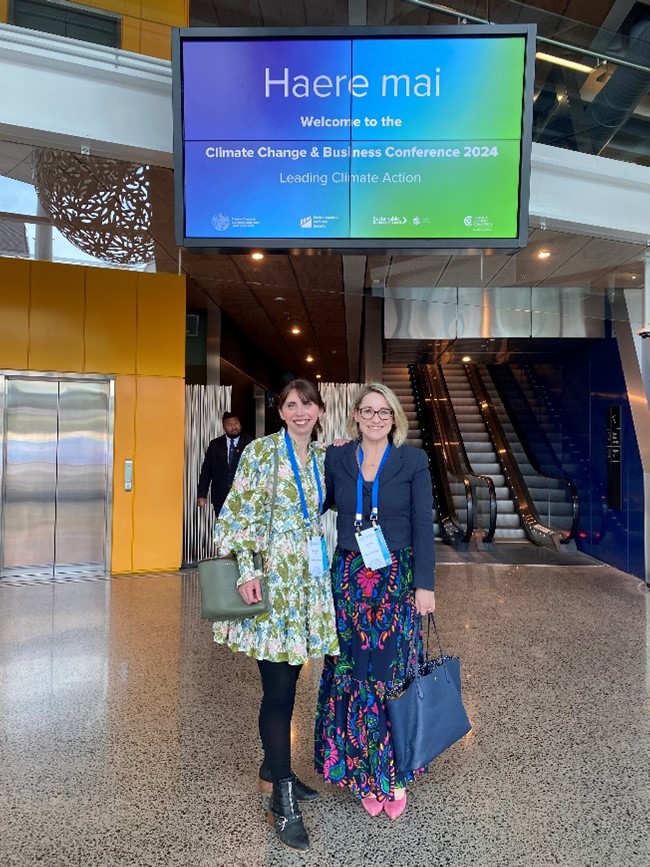This week, over 600 sustainability professionals and business leaders gathered in Auckland and online for the Climate Change and Business Conference 2024.
Russell McVeagh sponsored the event, and three of our Environmental, Social and Governance experts were in attendance. In this update, our team shares some of their main takeaways from the conference and, in particular, discussions around the challenges businesses face in Aotearoa as the transition towards a low-emissions, climate-resilient future continues.
- Effective collaboration between businesses and government is crucial
Many of the sessions at the conference emphasised the need for businesses and government to stand "shoulder to shoulder" in developing and implementing the solutions for New Zealand's transition to a low-emissions, climate-resilient future. On the Government-business relationship, the Minister for Climate Change, Hon Simon Watts, emphasised the Government's willingness to work with business and respond to feedback on the draft second emissions reduction plan due to be finalised by the end of this year, noting the role of the technology sector as an enabler to the transition as one area where the plan would likely change in response to feedback. Key remaining issues relating to collaboration include how the Government should best support businesses to deliver gross emissions reductions (e.g. through direct financial assistance or other mechanisms), and how to enable consistent access to accurate climate data between Government, the private sector and other stakeholders.
In addition to collaboration between business and government, the need for consensus-building across the political divide was a key theme of the business community's messaging to political leaders at the conference. Business leadersnoted that making investment and other business decisions about a long-term, chronic problem requires certainty in government policy across election cycles.
- Coordinated progress on climate change adaptation is required
This year's conference included a greater focus on climate change adaptation than in prior years, with several sessions dedicated to exploring how New Zealand can become more resilient to the impacts of climate change. A key theme of those sessions was a strong consensus that a coordinated approach to adaptation is crucial, ensuring that matters such as "new buildings in the right places" is coordinated with proactive and reactive approaches to managed retreat.
One key development in this space that many organisations will be watching is the progress of the adaptation inquiry currently being undertaken by the Finance and Expenditure Select Committee, launched in May of this year. In a panel session with three members of that Committee, it was made clear that the report that emerges will only be the beginning of a raft of changes required to implement an effective adaptation approach in New Zealand. Vexed questions such as "how will the costs of adaptation be shared between stakeholders?" are unlikely to be resolved by the report itself, and much will depend on the approach that the Government ultimately adopts following delivery of the report.
- New Zealand's emissions on the world stage
New Zealand's role in the international context was front and centre at this year's conference, with broad recognition that it is in New Zealand's self-interest as an exporting nation to take action on climate change given the international regulatory and commercial context. For example, developments like the European "Green Deal" (which includes extensive sustainability reporting obligations amongst other regulatory requirements) are driving large international customers to demand more from their key suppliers on climate change.
The Free Trade Agreement (FTA) between New Zealand and the European Union, which entered into force on 1 May 2024 and contains a number of provisions relating to climate change and the environment, was highlighted as setting a new "gold standard" for environmental protections in bilateral trade agreements. This is just one example of how the international context is evolving, with risks to New Zealand's "clean and green" reputation if it is perceived internationally as "watering down" its response or otherwise failing to take adequate action on climate change.
- Mobilising finance for the transition
A further key theme of the conference was mobilising finance for the transition, in particular in the context of New Zealand's energy and other infrastructure. One particularly interesting panel discussion on global markets highlighted that the investment in energy generation and transmission infrastructure required in New Zealand presents opportunities for offshore investment, however there is a problem of scale as many projects will be too small to attract large overseas. Accordingly, there is scope for collaboration and creativity in aggregating investment opportunities to attract the attention of the global market.
- Greenwashing remains front of mind
It is clear that greenwashing remains a key area of concern for many organisations, particularly in relation to setting and communicating climate-related targets. This can be a tricky area for organisations to navigate, with the need to balance stakeholder desire for ambitious targets that align with the Paris Agreement target of 1.5 degrees with the need to ensure that organisations are communicating their targets in a way that is not misleading. Under the mandatory climate-related disclosures regime which came into effect last year, many large New Zealand businesses are required to disclose the targets they use to manage climate-related risks and opportunities, and this has sharpened focus in this area.
While setting a target does not require an organisation to be 100% certain that the target will be achieved, organisations should ensure that their targets are based on reasonable assumptions and a genuine intention to try to meet them, to avoid allegations of greenwashing being made.





